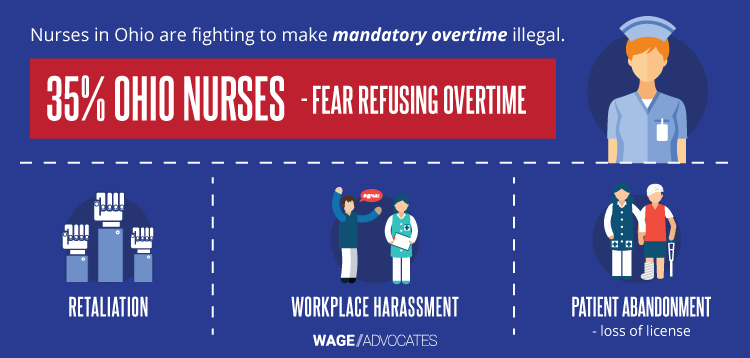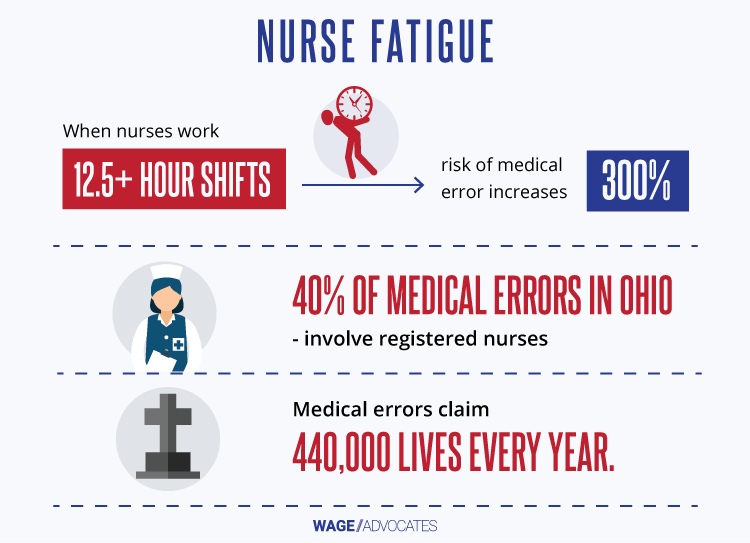Ohio Nurses Fight To End Mandatory Overtime
Nurses in Ohio are joining together in protest of the widespread use of mandatory overtime to cover staffing shortages in the State’s hospitals. On May 24, 2017, professional caregivers gathered in the atrium of the Buckeye State’s Columbus statehouse to demand legal changes that would give nurses a greater voice in staffing assignments, Columbus-based news station WBNS-10 reports.

Forced Overtime, Threats & Patient Abandonment
Current Ohio law prevents nurses from refusing to work overtime. Workers who turn down overtime hours, according to the Ohio Nurses Association (ONA), are routinely threatened by their employers, scared into submission with charges of patient abandonment, an infraction that could open nurses up to medical malpractice lawsuits or forfeit their license.
These threats work. In a poll conducted by the Ohio Nurses Association, 35% out of 170,000 nurses said they were afraid to refuse overtime because it could lead to a loss of license. That’s around 21,000 nurses, all of whom live in fear of retaliation or harassment in the workplace.
Lori Chovanak, executive director of the Association, believes the situation in Ohio is long past out-of-hand. “I can tell you that it’s the number one concern of the members of our organization,” she told reporters. “What we’re hearing from nurses…they’re telling us they are overworked, they’re telling us they are mandated to work overtime, they’re telling us they feel coerced.”
Medical Errors Skyrocket, But Go Unreported
While abandonment presents a true risk to patient health, so too, many Ohio nurses argue, do untenable levels of mandatory overtime. Ohio ranks far below other states in terms of patient safety, WBNS-10 writes. And more than 40% of medical errors in the State are committed by registered nurses. Experts say that fatigue is a primary driver behind these mistakes, which now claim around 440,000 lives every year nationwide.

Health regulators in the State, however, are largely oblivious to the problem. Medical errors are chronically under-reported in Ohio, especially when the mistakes involve nurses. The Ohio Board of Nursing has only received three reports of nursing-related medical errors in the last six years. When presented with an unreported case, in which oxygen was withheld from a patient, the Board’s Executive Director, Betsy Houchen, said, “if you don’t know about it, it’s as if it doesn’t exist. We regulate the nurses. We don’t regulate the hospitals themselves.”
Hospitals Oppose Mandatory Overtime Regulations
Look at this story for even a second and hospitals start to seem like the villain. The Ohio Hospital Association, which represents 220 hospitals in the State, strongly opposes the ONA’s proposal to ban mandatory overtime, a prohibition the nursing group hopes to make law. Here’s how the Association responded to the calls of nurses in a recent statement:
“We are opposed to that specific legislation. Staffing a hospital is a complex process that continually changes according to the number of patients and severity of conditions being treated in the hospital. Mandated staffing ratios restrict hospitals’ ability to adjust to the needs of their patients. Furthermore, fixed ratios improperly assume that all nurses share the same skill sets and are simply “interchangeable parts” in the treatment of patients.
Hospitals must have the flexibility to respond to the dynamic state of patient needs and must focus on a variety of factors other than staffing rations when determining staffing levels, while always keeping patient safety at the core of those decisions.”
No one with any knowledge of this topic would suggest that nurses are “interchangeable parts” with equal skill sets. But the benefits of nurse-to-patient ratios and cutting down on mandatory overtime are hard to ignore.
More Staff, Fewer Hours Can Save Lives
The link between nurse fatigue and preventable medical errors is now clear. Nurses already work extremely long shifts; many in Ohio are currently working three 12-hour shifts per week, or longer, due to overtime policies. In Ohio, state officials established a program in 2008 that many hoped would ease the burden on caregivers, requiring hospitals to implement nurse staffing plans and ensure adequate levels of competent practitioners.
Those plans, though, have failed, according to a growing number of nurses in the State, who say staffing levels are still far from adequate. Many practitioners argue that nurse staffing plans don’t cut down on the amount of mandatory overtime, but actually encourage the policy. The toll on patient and caregiver health cannot be understated. A report from the Joint Commission, the country’s largest hospital accreditation group, suggests that medical errors triple when nurses work shifts in excess of 12.5 hours. High staffing levels, on the other hand, contribute directly to reductions in avoidable medical mistakes.
Republican State Representative Robert Sprague, who says patient safety should be the first priority, has come out in support of the nurses’ cause. Sprague says he intends to introduce legislation that would prohibit mandatory overtime in Ohio’s hospitals, but admits that he’s fighting an uphill battle.
Ohio Nurses Describe Troubling Fatigue
The danger posed by excessive mandatory overtime isn’t theoretical. An exclusive investigation from Cleveland ABC-affiliate News 5 found that many nurses in Ohio are putting their patients in danger, struggling through fatigue and exhaustion as they work long hours of mandatory overtime.

Several nurses shared harrowing stories of how they battled troubling symptoms, including heart palpitations and anxiety, in the midst of patient care. One worker described being forced to work with a severe illness, “literally grabbing a waste paper basket to throw up while trying to stabilize a patient.” Many of these workers fear being disciplined for leaving their posts, along with an admirable desire to remain with patients who need care.
Complaints compiled by the Ohio Nurses Association show that these issues aren’t isolated. Nurses report working 12-hour shifts on just 4 hours of sleep, at facilities with 10-to-1 nurse-to-patient ratios. One worker was even forced to labor for 36 hours straight, forced to stay at the hospital due to a staffing shortage.
Mandatory Overtime Isn’t Just A Problem In Ohio
The fight against forced overtime in Ohio is likely to strike a chord with professional caregivers across the country. The majority of states, including Ohio, have not yet banned the use of mandatory overtime in hospitals. In fact, the policy has only been outlawed or restricted in 18 states, where nurses are not allowed to work longer than 12 hours in a 24-hour time period:
- Alaska
- California
- Connecticut
- Illinois
- Maine
- Maryland
- Massachusetts
- Minnesota
- Missouri
- New Hampshire
- New Jersey
- New York
- Oregon
- Pennsylvania
- Rhode Island
- Texas
- Washington
- West Virginia
Elsewhere, legislators have ignored the calls of nurses and nursing organizations, who overwhelmingly support tighter regulations on when and how hospitals and other healthcare facilities are allowed to force overtime on workers.
ANA: Caregivers Need Right To Refuse
In a position statement adopted on March 12, 2009, the American Nurses Association (ANA) stood behind the right of nurses to accept or reject assignments that threaten the health and safety of patients and workers as a professional and ethical obligation.

The organization, the nation’s leading group for professional caregivers, stressed the importance of allowing nurses to object in writing to unsafe assignments without fear of retaliation. Tellingly, the ANA noted that adequate staffing levels are a precondition for both nurse and patient well-being, pointing to the common practice of “floating,” in which nurses are temporarily shifted from over-staffed clinical areas to under-staffed ones, as a particular danger.
Nurse fatigue, however, came to become the American Nurses Association’s deepest source of worry. “Each registered nurse,” the organization wrote, “has an ethical responsibility to carefully consider her / his level of fatigue when deciding whether to accept any assignment extending beyond the regularly scheduled work day or week.”

